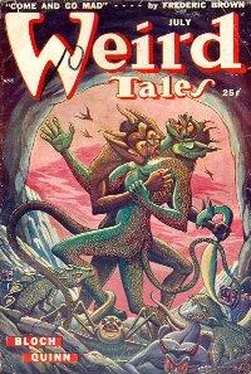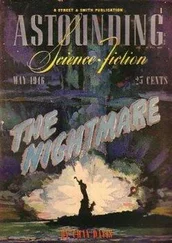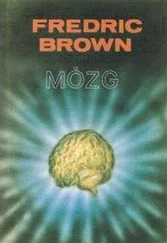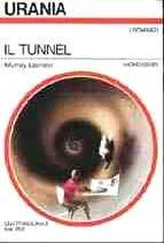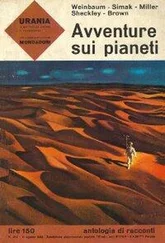Fredric Brown - Come and Go Mad
Здесь есть возможность читать онлайн «Fredric Brown - Come and Go Mad» весь текст электронной книги совершенно бесплатно (целиком полную версию без сокращений). В некоторых случаях можно слушать аудио, скачать через торрент в формате fb2 и присутствует краткое содержание. Год выпуска: 1949, Издательство: Weird Tales, Жанр: Фантастика и фэнтези, на английском языке. Описание произведения, (предисловие) а так же отзывы посетителей доступны на портале библиотеки ЛибКат.
- Название:Come and Go Mad
- Автор:
- Издательство:Weird Tales
- Жанр:
- Год:1949
- ISBN:нет данных
- Рейтинг книги:3 / 5. Голосов: 1
-
Избранное:Добавить в избранное
- Отзывы:
-
Ваша оценка:
- 60
- 1
- 2
- 3
- 4
- 5
Come and Go Mad: краткое содержание, описание и аннотация
Предлагаем к чтению аннотацию, описание, краткое содержание или предисловие (зависит от того, что написал сам автор книги «Come and Go Mad»). Если вы не нашли необходимую информацию о книге — напишите в комментариях, мы постараемся отыскать её.
Come and Go Mad — читать онлайн бесплатно полную книгу (весь текст) целиком
Ниже представлен текст книги, разбитый по страницам. Система сохранения места последней прочитанной страницы, позволяет с удобством читать онлайн бесплатно книгу «Come and Go Mad», без необходимости каждый раз заново искать на чём Вы остановились. Поставьте закладку, и сможете в любой момент перейти на страницу, на которой закончили чтение.
Интервал:
Закладка:
But was the truth as he knew it?
That was the haunting ghost that had ridden him for three years now, since the very hour when he had awakened to whiteness in a white room and a stranger, strangely dressed, had been sitting beside a bed the like of which had been in no field hospital he’d ever heard of or seen. A bed with an overhead framework. And when he looked from the stranger’s face down at his own body, he saw that one of his legs and both of his arms were in casts and that the cast of the leg stuck upward at the angle, a rope running over a pulley holding it so.
He’d tried to open his mouth to ask where he was, what had happened to him, and that was when he had discovered the cast on his jaw.
He’d stared at the stranger, hoping the latter would have sense enough to volunteer the information and the stranger had grinned at him and said, “Hi, George. Back with us, huh? You’ll be all right.”
And there was something strange about the language until he placed what it was. English. Was he in the hands of the English? And it was a language, too, which he knew little of, yet he understood the stranger perfectly. And why did the stranger call him George?
Maybe some of the doubt, some of the fierce bewilderment, showed in his eyes, for the stranger leaned closer to the bed. He said, “Maybe you’re still confused, George. You were in a pretty bad smashup. You ran that coupe of yours head-on into a gravel truck. That was two days ago, and you’re just coming out of it for the first time. You’re all right, but you’ll be in the hospital for a while, till all the bones you busted knit. Nothing seriously wrong with you.”
And then waves of pain had come and swept away the confusion, and he had closed his eyes.
Another voice in the room said, “We’re going to give you a hypo, Mr. Vine,” but he hadn’t dared open his eyes again. It was easier to fight the pain without seeing.
There had been the prick of a needle in his upper arm. And pretty soon there’d been nothingness.
When he came back again—twelve hours later, he learned afterwards—it had been to the same white room, the same strange bed, but this time there was a woman in the room, a woman in a strange white costume standing at the foot of the bed studying a paper that was fastened on a niece of board.
She had smiled at him when she saw that his eyes were open. She said, “Good morning, Mr. Vine. Hope you’re feeling better. I’ll tell Dr. Holt that you’re back with us.”
She went away and came back with a man who was also strangely dressed, in roughly the same fashion as had been the stranger who had called him George.
The doctor looked at him and chuckled. “Got a patient, for once, who can’t talk back to me. Or even write notes.” Then his face sobered. “Are you in pain, though? Blink once if you’re not, twice if you are.”
The pain wasn’t really very bad this time, and he blinked once. The doctor nodded with satisfaction. “That cousin of yours,” he said, “has kept calling up. He’ll be glad to know you’re going to be back in shape to—well, to listen if not to talk. Guess it won’t hurt you to see him a while this evening.”
The nurse rearranged his bedclothing and then, mercifully, both she and the doctor had gone, leaving him alone to straighten out his chaotic thoughts.
Straighten them out? That had been three years ago, and he hadn’t been able to straighten them out yet:
The startling fact that they’d spoken English and that he’d understood that barbaric tongue perfectly, despite his slight previous knowledge of it. How could an accident have made him suddenly fluent in a language which he had known but slightly?
The startling fact that they’d called him by a different name. “George” had been the name used by the man who’d been beside his bed last night. “Mr. Vine,” the nurse had called him. George Vine, an English name, surely.
But there was one thing a thousand times more startling than either of those: It was what last night’s stranger (Could he be the “cousin” of whom the doctor had spoken?) had told him about the accident. ” You ran that coupe of yours head-on into a gravel truck.”
The amazing thing, the contradictory thing, was that he knew what a coupe was and what a truck was. Not that he had any recollection of having driven either, of the accident itself, or of anything beyond that moment when he’d been sitting in the tent after Lodi—but—but how could a picture of a coupe, something driven by a gasoline engine, arise to his mind when such a concept had never been in his mind before.
There was that mad mingling of two worlds—the one sharp and clear and definite. The world he’d lived his twenty-seven years of life in, in the world into which he’d been born twenty-seven years ago, on August 15th, 1769, in Corsica. The world in which he’d gone to sleep—it seemed like last night—in his tent at Lodi, as General of the Army in Italy, after his first important victory in the field.
And then there was this disturbing world into which he had awakened, this white world in which people spoke an English—now that he thought of it—which was different from the English he had heard spoken at Brienne, in Valence, at Toulon, and yet which he understood perfectly, which he knew instinctively that he could speak if his jaw were not in a cast. This world in which people called him George Vine, and in which, strangest of all, people used words that he did not know, could not conceivably know, and yet which brought pictures to his mind.
Coupe, truck. They were both forms of—the word came to his mind unbidden—automobiles. He concentrated on what an automobile was and how it worked, and the information was there. The cylinder block, the pistons driven by explosions of gasoline vapor, ignited by a spark of electricity from a generator.
Electricity. He opened his eyes and looked upward at the shaded light in the ceiling, and he knew, somehow, that it was an electric light, and in a general way he knew what electricity was.
The Italian Galvani—yes, he’d read of some experiments of Galvani, but they hadn’t encompassed anything practical such as a light like that. And staring at the shaded light, he visualized behind it water power running dynamos, miles of wire, motors running generators. He caught his breath at the concept that came to him out of his own mind, or part of his own mind.
The faint, fumbling experiments of Galvani with their weak currents and kicking frogs’ legs had scarcely fore-shadowed the unmysterious mystery of that light up in the ceiling; and that was the strangest thing yet; part of his mind found it mysterious and another part took it for granted and understood in a general sort of way how it all worked.
Let’s see, he thought, the electric light was invented by Thomas Alva Edison somewhere around—Ridiculous; he’d been going to say around 1900, and it was now only 1796!
And then the really horrible thing came to him and he tried—painfully, in vain—to sit up in bed. It had been 1900, his memory told him, and Edison had died in 1931. And a man named Napoleon Bonaparte had died a hundred and ten years before that, in 1821.
He’d nearly gone insane then.
And, sane or insane, only the fact that he could not speak had kept him out of a madhouse; it gave him time to think things out, time to realize that his only chance lay in pretending amnesia, in pretending that he remembered nothing of life prior to the accident. They don’t put you in a madhouse for amnesia. They tell you who you are, let you go back to what they tell you your former life was. They let you pick up the threads and weave them, while you try to remember.
Three years ago he’d done that. Now, tomorrow, he was going to a psychiatrist and say that he was—Napoleon!
Читать дальшеИнтервал:
Закладка:
Похожие книги на «Come and Go Mad»
Представляем Вашему вниманию похожие книги на «Come and Go Mad» списком для выбора. Мы отобрали схожую по названию и смыслу литературу в надежде предоставить читателям больше вариантов отыскать новые, интересные, ещё непрочитанные произведения.
Обсуждение, отзывы о книге «Come and Go Mad» и просто собственные мнения читателей. Оставьте ваши комментарии, напишите, что Вы думаете о произведении, его смысле или главных героях. Укажите что конкретно понравилось, а что нет, и почему Вы так считаете.
